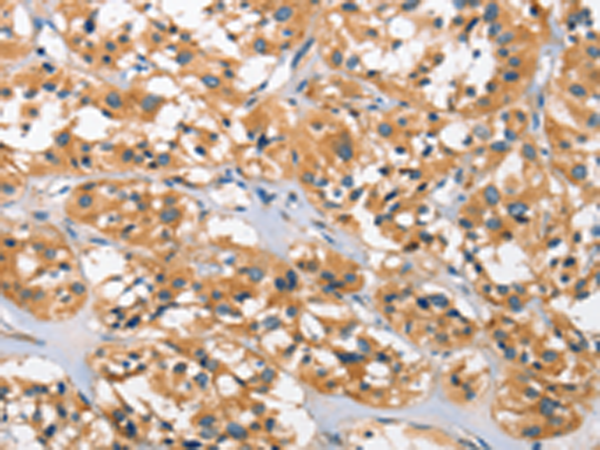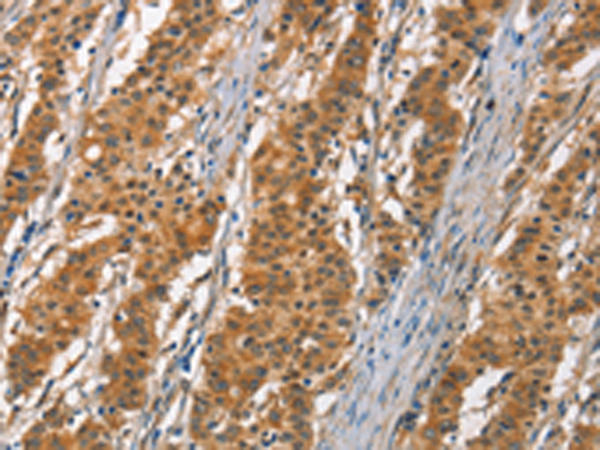

| WB | 咨询技术 | Human,Mouse,Rat |
| IF | 咨询技术 | Human,Mouse,Rat |
| IHC | 1/25-1/100 | Human,Mouse,Rat |
| ICC | 技术咨询 | Human,Mouse,Rat |
| FCM | 咨询技术 | Human,Mouse,Rat |
| Elisa | 1/1000-1/2000 | Human,Mouse,Rat |
| Aliases | RIG; REIC |
| Host/Isotype | Rabbit IgG |
| Antibody Type | Primary antibody |
| Storage | Store at 4°C short term. Aliquot and store at -20°C long term. Avoid freeze/thaw cycles. |
| Species Reactivity | Human, Mouse |
| Immunogen | Fusion protein of human DKK3 |
| Formulation | Purified antibody in PBS with 0.05% sodium azide and 50% glycerol. |
+ +
以下是3-4篇与DKK3抗体相关的研究文献及其摘要概括:
---
1. **文献名称**: *DKK3 as a potential biomarker for renal fibrosis and therapeutic target via Wnt/β-catenin signaling*
**作者**: Zhou D, et al.
**摘要**: 该研究探讨了DKK3在肾纤维化中的作用,发现其通过抑制Wnt/β-catenin通路促进纤维化。研究者开发了一种抗DKK3中和抗体,并在小鼠模型中验证其可减轻肾脏纤维化,提示其作为治疗慢性肾病的新策略。
2. **文献名称**: *Anti-DKK3 Antibody Attenuates Tumor Growth and Improves Chemotherapy Response in Pancreatic Cancer*
**作者**: Wang L, et al.
**摘要**: 研究发现胰腺癌中DKK3高表达与不良预后相关。通过开发特异性抗DKK3单克隆抗体,实验显示其能抑制肿瘤细胞增殖并增强化疗药物敏感性,机制涉及调控Wnt信号和肿瘤微环境重塑。
3. **文献名称**: *DKK3 Antibody-Based Immunoassay for Early Detection of Alzheimer's Disease*
**作者**: Smith JR, et al.
**摘要**: 该研究验证了脑脊液中DKK3水平与阿尔茨海默病(AD)的相关性,并开发了一种高灵敏度抗DKK3抗体检测方法。临床样本分析表明,DKK3可作为AD早期诊断的生物标志物,且与tau蛋白病理密切相关。
4. **文献名称**: *Targeting DKK3 with Neutralizing Antibodies Ameliorates Pulmonary Hypertension in Rodent Models*
**作者**: Kim H, et al.
**摘要**: 研究揭示了DKK3在肺动脉高压(PH)中的促血管重塑作用。使用抗DKK3中和抗体治疗可显著降低大鼠模型的肺动脉压力,机制涉及抑制异常血管平滑肌增殖和炎症反应。
---
以上文献涵盖了DKK3抗体在疾病治疗、生物标志物开发及分子机制研究中的应用,具体内容可通过PubMed或期刊官网进一步查阅。
**Background of DKK3 Antibody**
The Dickkopf-related protein 3 (DKK3) is a member of the DKK family, which comprises secreted glycoproteins (DKK1-4 and soggy) known for modulating Wnt signaling pathways. Unlike DKK1 and DKK2. which primarily inhibit canonical Wnt/β-catenin signaling by binding to LRP5/6 co-receptors, DKK3 exhibits a more complex and context-dependent role. It weakly interacts with LRP6 and may regulate non-canonical Wnt pathways or other receptors (e.g., Kremen or integrins), influencing cellular processes such as apoptosis, differentiation, and tissue remodeling.
DKK3 is expressed in various tissues, including the kidney, heart, and endothelial cells, and is implicated in both physiological and pathological conditions. In cancer, DKK3 often acts as a tumor suppressor, with reduced expression linked to promoter hypermethylation in carcinomas (e.g., lung, prostate) and gliomas. Conversely, its overexpression in pancreatic or colorectal cancers correlates with poor prognosis, highlighting its dual role. Beyond oncology, DKK3 is associated with fibrosis, cardiovascular diseases, and neurodegenerative disorders, where it may promote tissue repair or pathogenic remodeling.
DKK3 antibodies are essential tools for detecting DKK3 expression in research and diagnostics. They aid in elucidating DKK3's mechanistic roles, validating its interactions, and exploring therapeutic potential. For instance, antibody-based DKK3 inhibition is being investigated in fibrotic diseases, while DKK3-targeted therapies aim to restore its tumor-suppressive functions. Additionally, DKK3 serves as a biomarker for disease progression or therapeutic response. Ongoing studies continue to unravel its pleiotropic effects, positioning DKK3 antibodies as critical reagents in both basic and translational research.
×